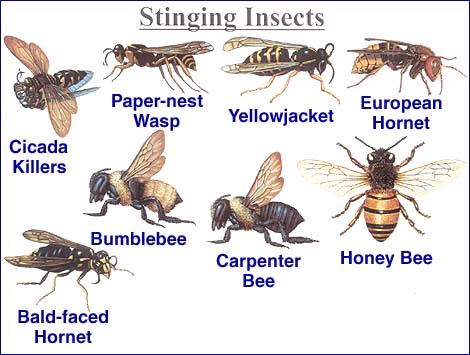Mention stinging insects and most people will instantly think of wasps. They certainly qualify as a stinging insects. In most cases stinging insects don’t carry diseases, other flying insects are a different story.
In fact, for most people, they are a painful nuisance which is generally a good enough reason to find out more about your local exterminators. This is especially true if you are prone to allergic reactions, which makes it more likely you’ll have an allergic reaction to a stinging insect. Naturally, a serious reaction may need hospital care.
That’s why you need to be aware of the most common stinging insects in your garden and how to effectively keep them away from your home. Obviously, if you suffer from allergic reactions it is best to learn more here about your local pest control experts and let them deal with the insects for you.
Bees
Bees are essential for pollination and a valuable part of the Earth’s ecosystem. In many cases pest control companies will not destroy a bees nest, instead, they will get a local specialist to move it and protect it.
There are different types of bees.
- Honey bees
Honey bees are some of the smallest and essential for pollination. They won’t sting unless they feel threatened but, when they do sting, they leave part of their stinger behind. This increases the strength of the allergic reaction you can experience.
- Bumblebees
Bumblebees are larger than honey bees but are also an essential part of the ecosystem. They are generally peaceful but fiercely protective. That means if you accidentally disturb their nest they will sting and they can sting repeatedly.
- Carpenter bees
Carpenter bees generally live by themselves and they make homes by creating tunnels in wood. They are very peaceful and unlikely to sting. But, they can cause a significant amount of damage to the wood in your home.
Wasps
This is another stinging insect where there are lots of different types. These are the two most common:
- Paper Wasps
These almost delicate-looking wasps create nests from paper. They generally create them hanging from something, that could be a porch roof, tree branch, or almost anything else!
They won’t generally bother about you unless they think you are attacking their nest. Then they can sting repeatedly.
- Cicada Wasps
The cicada is also known as the killer wasp. These insects are as big as 1.5 inches, making them easy to spot. They live by themselves but are comfortable nesting near each other. They tend to burrow into the ground and won’t sting unless you disturb their home.
But, they will pack a punch when they do sting.
Hornets
Hornets appear similar to wasps but the European hornet is significantly larger than a wasp. It’s worth noting that the Asian hornet has been seen in the US but it is still a very rare sight. This is good as it is the most dangerous of all the hornets.
- European Hornet
The European hornet is large than any wasp and can be seen at any time of the day. It lives in a colony that can be as big as 400 hornets. Signs of a nest are generally obvious as they will be flying around the area and they will have a paper structure covering the entrance to the main nest.
Their sting is painful and they can sting repeatedly. They also eat cellulose, potentially damaging the wood in your home.
- Bald-Faced Hornet
The bald-faced hornet is smaller than the European but more aggressive. Their nests can be as big as 24×24 inches and they build a new nest every year. They are most active in the second part of the summer and will attack at the slightest provocation.
Final Thoughts
The best approach is to avoid stinging insects and if you find a nest on your property call the experts to handle it. You can also talk with your local experts regarding steps you can take to keep stringing insects off your property in the first place.
This will reduce the risk of you being accidentally stung. Of course, you should always be vigilant, you can never be sure where there is a nest.








